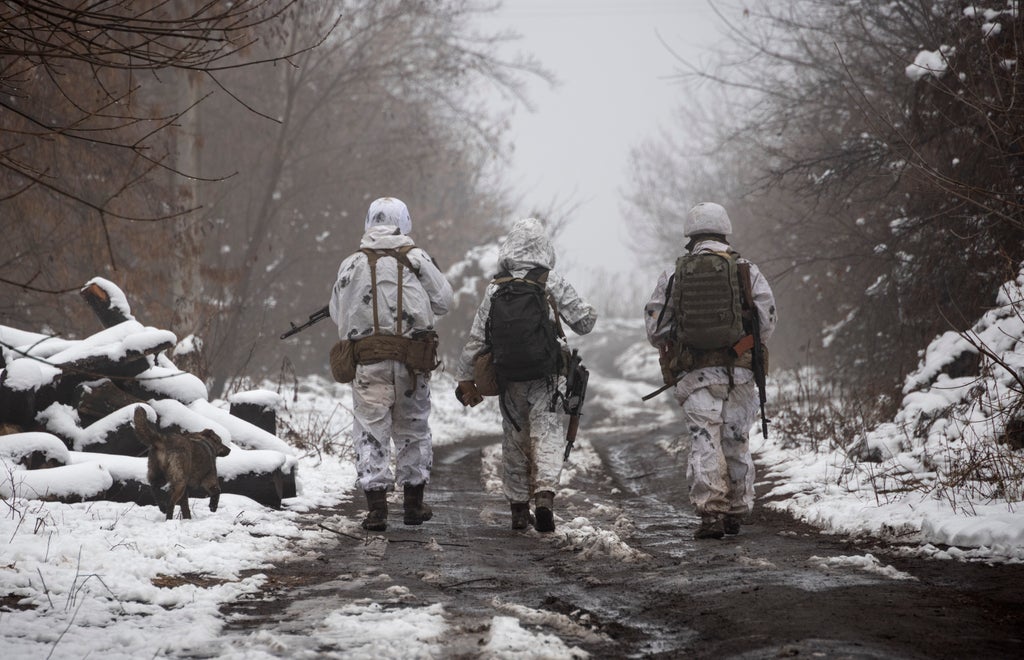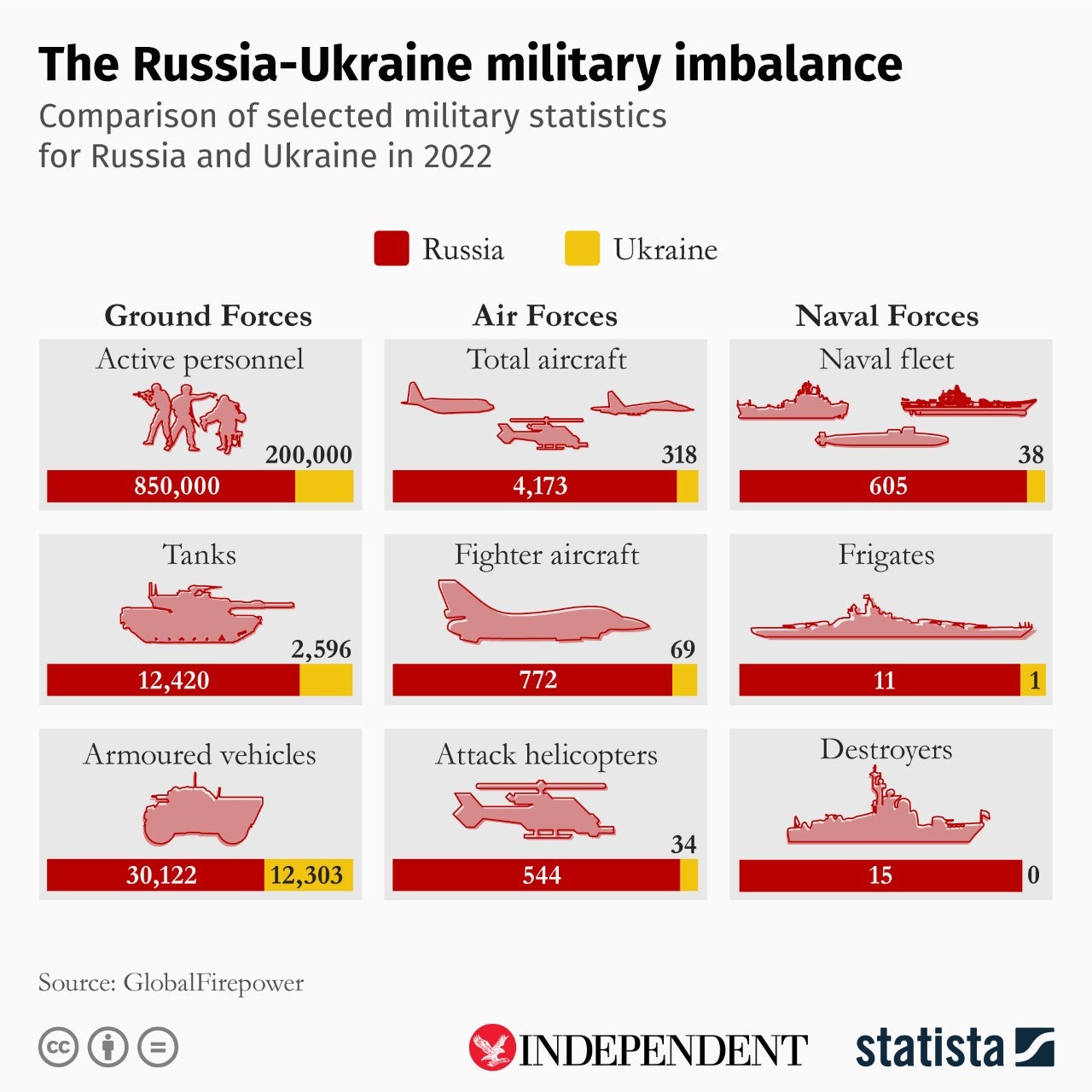
Russia has announced a “special military operation” in eastern Ukraine, confirming fears that the country has been preparing for an invasion after stationing troops along the border, with frantic diplomatic efforts likely not succeeding in averting hostilities.
Reports have now started coming in of gunfire and explosions from at least five places in Ukraine and near the Russian border, soon after Vladimir Putin announced the “special military operation” on Thursday.
Ukraine’s UN envoy said, soon after Mr Putin’s speech, that Russia had declared war on the country, adding that it was the responsibility of the United Nations Security Council (UNSC) to stop the war.
The UK, which had earlier warned that the incursions had already begun after Russia had moved to recognise the breakaway regions of the Donetsk People’s Republic (DPR) and Luhansk People’s Republic (LPR) as independent states, has said Russia’s actions were “unprovoked” and “unjustified”.
Russia’s earlier move of recognising the regions had allowed it to openly move its forces into the rebel-held separatist regions of Donbas in the name of protecting an ally.
The international community hit out at the decision, with the United Nations Security Council expressing “great concern” and the US suggesting, apparently correctly, that the play was a pretext for a full-scale military assault.
Vassily Nebenzia, the Russian ambassador to the UN, insisted there would be no “new bloodbath” in eastern Ukraine but warned the West to “think twice” before making matters worse.
“We remain open to diplomacy for diplomatic solution,” he said. “However, allowing bloodbath in Donbas is something we don’t intend to do. We are forced to note the negative role played by our western colleagues led by the US.”
UK defence secretary Ben Wallace said the areas had been “effectively annexed” from Ukraine while prime minister Boris Johnson has already promised that Russia will face a “barrage of sanctions”, with the US and EU expected to take similar actions as a deterrent.
So what is actually going on in Eastern Europe, where did it all begin and how might the crisis unfold?
How did the crisis start?
Going back eight years gives the current crisis more context.
Russia annexed Ukraine’s Crimean Peninsula in 2014 after the country's Moscow-friendly president Viktor Yanukovych was driven from power by mass protests.
Weeks later, Russia threw its weight behind a separatist insurgency that broke out in Ukraine's east, which eventually saw the pro-Russian rebels declare the DPR and LPR independent states, although they previously went entirely unacknowledged by the international community.
More than 14,000 people have died in the fighting that has been ongoing throughout the intervening years and which has devastated Ukraine’s eastern industrial heartland.
Both Ukraine and the West have accused Russia of sending troops and weapons to back the rebels but Moscow has denied the allegations, stating that Russians who joined the separatists did so voluntarily.
A 2015 peace accord – the Minsk II agreement – was brokered by France and Germany to help end the large-scale battles. The 13-point agreement obliged Ukraine to offer autonomy to separatist regions and amnesty for the rebels while Ukraine would regain full control of its border with Russia in the rebel-held territories.
The agreement is highly complex, however, because Moscow continues to insist it has not been a party in the conflict and is therefore not bound by its terms.
In point 10 of the agreement, there is a call for the withdrawal of all foreign armed formations and military equipment from the disputed DPR and LPR. Ukraine says this refers to forces from Russia but Moscow has previously denied it has any troops in those states.
Last year, a spike in ceasefire violations in the east and a Russian troop concentration near Ukraine fuelled fears that a new war was about to erupt but tensions abated when Moscow pulled back the bulk of its forces after manoeuvres in April.
How is the situation at present?
In early December 2021, US intelligence officials determined that Russia was planning to deploy as many as 175,000 troops near Ukraine’s border in preparation for a possible invasion that they believed could begin in early 2022.
Kyiv had complained in December that Moscow had placed over 90,000 troops near from the two countries’ border, warning that “large scale escalation” was possible in January.
Additionally, the commander-in-chief of the Ukrainian armed forces said Russia has about 2,100 military personnel in Ukraine’s rebel-controlled east and that Russian officers hold all commanding positions in the separatist forces.
Moscow had earlier repeatedly denied the presence of its troops in eastern Ukraine, not providing any details about its military numbers and locations, saying that their deployment on its own territory should not concern anyone.

Meanwhile, Russia has accused Ukraine of breaching Minsk II and has criticised the West for failing to encourage Ukrainian compliance.
Amid the acrimony, Mr Putin has rejected a four-way meeting with Ukraine, France and Germany, saying it is useless in light of Ukraine’s refusal to abide by the 2015 pact.
Moscow has also strongly criticised the US and its Nato allies for providing Ukraine with weapons and holding joint drills, saying that this encourages Ukrainian hawks to try to regain the rebel-held areas by force.
What might happen next?
With Mr Putin’s Thursday announcement of the “special military operation” and subsequent ground reports of explosions and gunfire being heard in many places in Ukraine, fears of the situation reaching boiling point have been confirmed.
Moscow had earlier repeatedly denied talk of an invasion, even as Mr Putin’s announcement has all but likely confirmed it. After the announcement, a Russian envoy to the UN said Moscow was not being aggressive to the Ukrainian people, but was against the government in power.
Western leaders, in turn, have attacked the move, and will now likely move to toughen sanctions and push for an international pariah status for Russia.
US president Joe Biden has condemned Russia’s attack as “unprovoked and unjustified” and said Russia would be held accountable.
“Russia alone is responsible for the death and destruction this attack will bring, and the United States and its Allies and partners will respond in a united and decisive way,” he said in a statement.
Meanwhile, personnel from both the US and UK embassies in the Ukrainian capital have been ordered home – a move Ukrainian president Volodymyr Zelensky labelled “overreacting.”
While the sanctions threatened by the West would be considerable, it remains to be seen whether Russia would take any notice.
Speaking at the White House this month, Mr Biden warned Mr Putin once again: “I don’t know that he knows what he’s going to do, and I think he has to realise that it would be a gigantic mistake for him to move on Ukraine. The impact on Europe and the rest of the world would be devastating, and he would pay a heavy price.
“I have been very, very straightforward and blunt with President Putin, both on the phone and in person – we will impose the most severe sanctions that have ever been imposed, economic sanctions, and there will be a lot to pay for that down the road.
“It will affect others as well, it will affect us somewhat, it will affect Europeans. But it will have a profound impact on his economy.”







